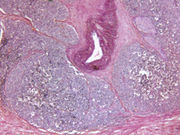Home 2016
Yearly Archives: 2016
Early-Life Exercise May Promote Lifelong Brain Function
Exercise-induced alterations in microbiota produce extensive neural and metabolic benefits
ASCO: CTC Heterogeneity Predicts Hormone Tx Response in mCRPC
Patients with higher heterogeneity score did not respond well to hormone therapy
Dark Chocolate Consumption Daily Can Exacerbate Acne
Findings in males with acne-prone skin; statistically significant changes seen as early as two weeks
Inherited Mutations in 18 Percent With Ovarian Cancer
Mutations seen in BRCA1/2, DNA mismatch repair genes, other suspected/established risk genes
Novel Antigen Implicated in Immediate Hypersensitivity to Beer
In mass spectrometric analysis, main antigen identified as protein with similarity to z-type serpin
Researchers Calculate Family Risk Estimates for Cancer
Estimated 33 percent of overall risk is genetic; certain types of cancer have additional risk
For HIV-Infected, Number of Daily Pills Decreasing
Reduction in number of daily pills from 2005 to 2012; only 50.9 percent on BID regimen in 2012
ASCO: Aspirin Use Linked to Lower Risk of Lethal Prostate CA
Risk of prostate cancer mortality reduced with regular aspirin use after diagnosis
Pesticide in Milk Years Ago May Be Linked to Signs of Parkinson’s
Men in Hawaii who drank more milk showed brain changes, but more research needed to confirm link
Many Patients Using E-Mail As First Method of Provider Contact
Online communications reduced need for phone calls and office visits for many














